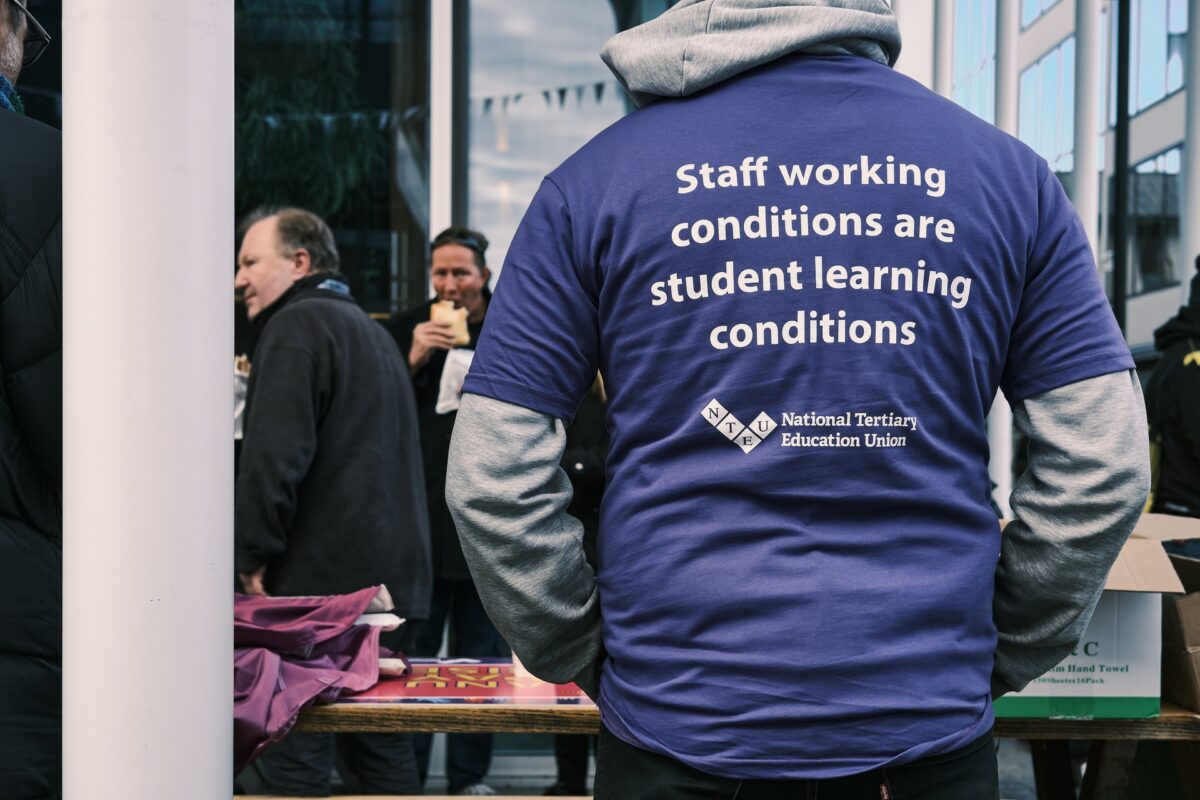This week, the ANU initiated the renegotiation of the staff enterprise agreement. This enterprise agreement governs working conditions for all ANU staff, including salaries and wages, academic freedom and leave entitlements.
Notably, “senior management staff,” including the Vice-Chancellor and College Deans, are exempt from enterprise agreements. Their contracts are drafted on a performance basis, rather than an ANU salary level.
In late August, the National Tertiary Education Union (NTEU) demonstrated on campus, asking for a universal 5 percent pay rise and the initiation of bargaining on the agreement. In an email sent to staff this week, the ANU confirmed that negotiation had begun on formulating a new agreement.
NTEU Salary and wage requests include a 17 percent employer superannuation contribution, an increased loading on the casual hourly rate of 50 percent and remuneration for the reuse of teaching materials produced by academic staff.
In relation to casual staff, demands include the publishing of monthly statistics on the number of casual and full-time staff employed by the University, as well as the promotion of improved pathways to permanent part- or full-time employment. Leave demands include paid annual, personal, and long-service leave for all staff, including casuals.
Workload is a prominent area of concern for the union, with a request for non-lecture classes to be capped at 22 students; a practice that would also likely improve students’ learning conditions. The “right to disconnect” is also covered in the claim, with staff wishing to be uncontactable outside of work hours.
Additionally, the NTEU has requested that SELT (Student Experience of Learning and Teaching) surveys do not inform promotion or performance review of ANU staff. This suggestion recognises the potential inaccuracies of SELT reviews, which typically have low participation rates. However, it could leave students with fewer avenues to review performance of academic staff.
The ANU NTEU branch are also seeking a three percent Aboriginal and Torres Strait Islander staff target by 2024, as well as the establishment of a consultation committee within three months of the new agreement taking effect.
Other equity measures include gender affirmation/transition leave and simplifying name change protocols for staff, menstrual and menopausal leave of six days a year and 30 weeks paid parental leave for both parents.
On equity measures more generally, the NTEU noted “not everything needs to be in an Enterprise Agreement.” The union confirmed that some of these measures, in their view, could be codified in policy.
However, “where entitlements are involved” the NTEU believes “they are always more enforceable and less easily changed if they are in the Enterprise Agreement.” The union noted that “an Enterprise Agreement is enforceable in forums like the Fair Work Commission if necessary.”
When asked about their goals for the bargaining stage, the NTEU stated, “We have key claims around fair salaries, healthy workloads, better job security, and flexible work, including the right to work from home.”
The NTEU also mentioned the relationship between students and staff, as “staff working conditions are student learning conditions, and staff want to see improvements for a better ANU.”
The NTEU stated that although they would “love to see a new agreement finalised within three months…these processes often take longer.” However, they also noted that some requests, such as the five percent administrative pay rise, the “ANU can do right now.”
In the NTEU’s view, this “would be an indication that ANU Senior Executive support, value and respect the contributions of ANU staff”, and would “set the tone for a productive and collegial enterprise bargaining period.”
When asked for comment, the ANU did not give an indication of a predicted timeline for the agreement, or any specific response to NTEU claims, but did state that “[s]taff are encouraged to and are able to provide their feedback, suggestions and ideas for this new agreement”, with “the University look[ing] forward to working constructively and collaboratively with all employee representatives to continue to provide strong and competitive conditions to all ANU staff.”
With respect to unions, the spokesperson stated that “[a]s part of the bargaining process the University has also entered into discussions with the NTEU and other nominated unions.”
An ANU spokesperson additionally emphasised that “ANU has some of the best working conditions in Australian higher education”, citing “sector-leading policies on parental leave, competitive salaries, generous leave entitlements…” and “…employment policies that target underrepresented groups in the higher education sector.”
The new enterprise agreement, whenever finalised, is predicted to determine ANU Staff conditions until the end of 2024.
We acknowledge the Ngunnawal and Ngambri people, who are the Traditional Custodians of the land on which Woroni, Woroni Radio and Woroni TV are created, edited, published, printed and distributed. We pay our respects to Elders past and present. We acknowledge that the name Woroni was taken from the Wadi Wadi Nation without permission, and we are striving to do better for future reconciliation.
